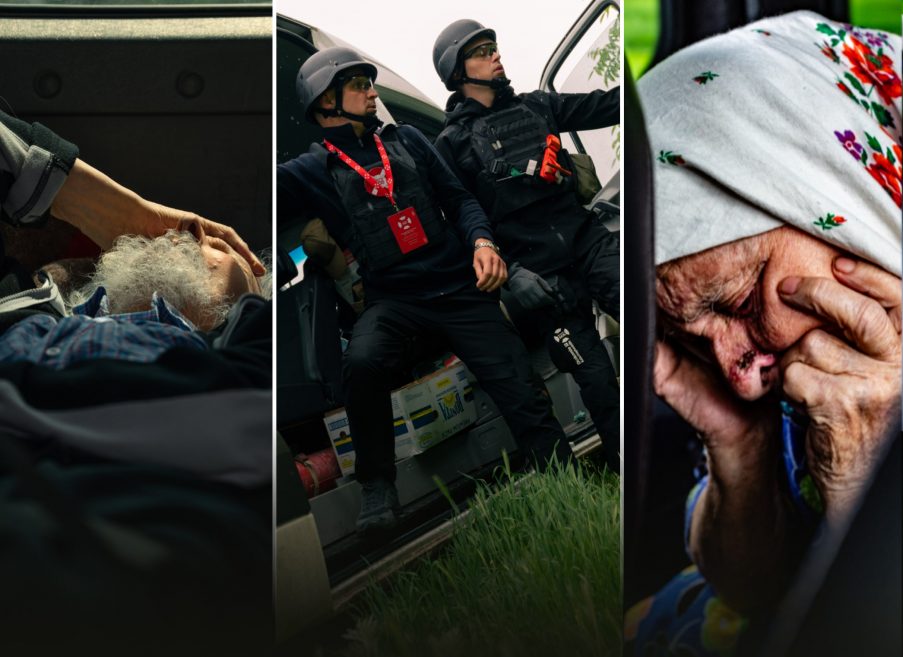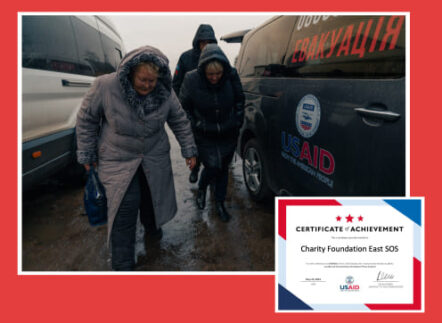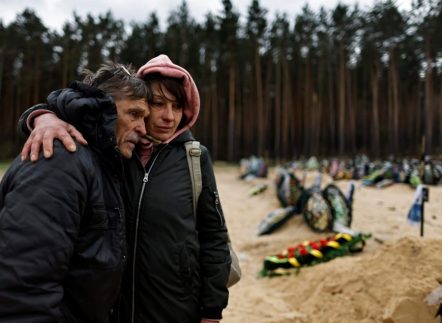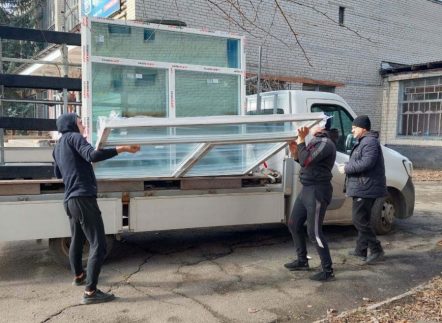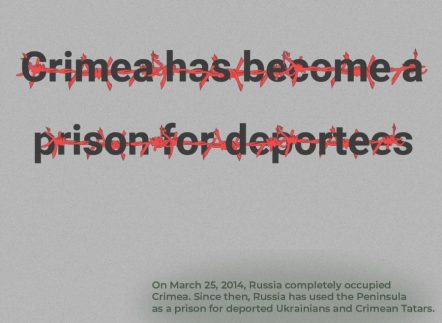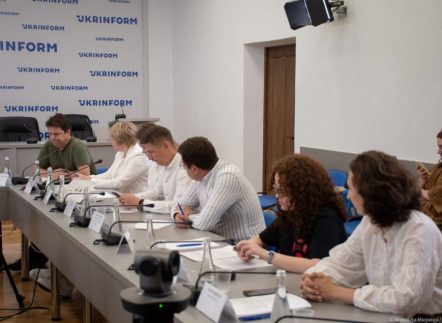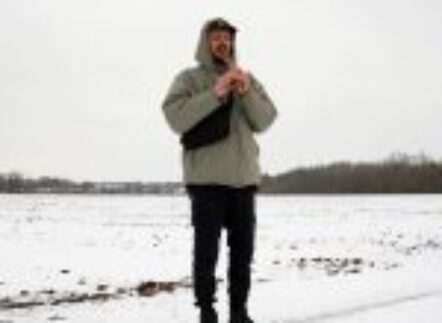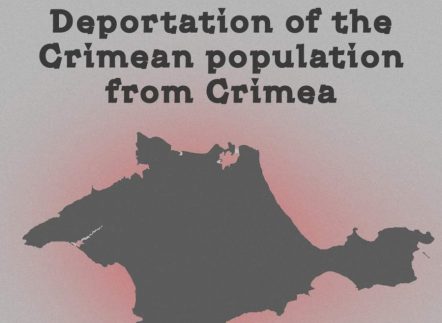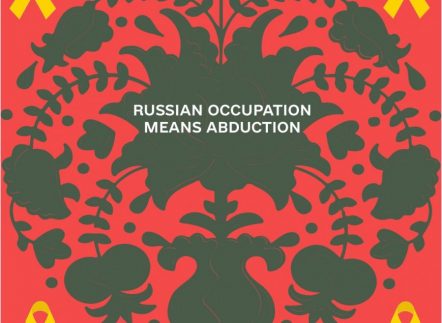Valeria Dolynska, a 62-year-old resident of the village of Kapitolivka in the Kharkiv region (respondent’s name has been changed for security reasons), recalls the beginning of the full-scale invasion:
“On the night of March 4, they started bombing us… We hastily packed our things, documents and left for the neighboring village – Spivakivka, which is in the forest… For about two or three weeks, we only heard explosions in Izyum”.
That day, the Dolynskyi family had to leave all the property they had acquired, the two-storey house, the farm – the family kept several dozen chickens. These chickens, as the villagers later told Valeria, became useful to the whole village when the delivery of products stopped.
Currently, she lives with her husband in a compact settlement in Transcarpathia and agreed to tell her story to Vostok SOS documentarians Maria Biliakova and Serhii Shpilev.
However, at the beginning of April, the decision of the Dolynskyi family to wait out the hostilities in Spivakivka turned out to be wrong. Fighting broke out in the immediate vicinity of the village between the Armed Forces of Ukraine and the russian army, which was trying to cross the Siverskyi Donets River.
Somewhere three kilometers north of Spivakivka, russian tanks were constantly shelling the right bank of the Donets in the direction of the village of Zavody, where the Ukrainian military was stationed at the time. At the same time, the russians tried to build a pontoon bridge across the Donets – it was destroyed several times by the Ukrainian army. Due to constant loud explosions, life in Spivakivka became simply unbearable.
Since the russian military stood between Spivakivka and Izyum, the inhabitants of this village were trapped. Only one way was relatively safe – by car on a dirt road through the forest. In the floodplain to the pedestrian bridge across Donets, which could be used to cross to the village of Petrivske.
This road was used from time to time by the residents of Spivakivka who went to Petrivske for food. But those who tried to leave Spivakivka had to leave their cars, go on foot to the right bank of the river and in the future go from Petrivske, having agreed with acquaintances or transporters.
“At first we didn’t leave, because it was a shame to throw the car away, because we had already lost everything… [We thought] at least let the car stay,” Valeria describes the situation. “And then it got to the point that we didn’t need the car either”.
The Dolynski family was supposed to leave this way on April 17, but already on April 16, the road through Petrivske became dangerous: on that day, a convoy of three civilian cars was shot by russian special forces with machine guns.
“They (russian military – note: N.M. Kaplun) came in like this: yesterday they were not there, but in the morning [the people] are leaving, and they are already in the village…” Valeria describes the events of that day. – [Cars] were shot, they were covered right in the forest… While there were only small-arms [weapons] – submachine guns, submachine gunners. And then the next day tanks already entered [in Spivakivka]… They were driven by three civilian cars… They didn’t know that the russians had entered, no one knew… And then they just left, they decided to abandon the cars and everything, just to escape from here… They shot at three cars: in one car, two people were killed, two boys… in the other car, a boy was wounded, I don’t know their names… And the L***vy family was driving – a married couple, their child – a 15-year-old girl and the mother of this young woman. The woman was shot in both legs, the girl and the man are alive, and her mother died… Two cars stopped, and the L***y somehow left, simply ran away… They have now left for Germany. Yulia L***va was shot in both legs, she was treated here for a month, they could not cure her. Because they had a cat in the car and hair from the cat got into the bullet hole… They left for Germany, they recently called, she has already started to recover”.
Thus, on April 17, the russian military entered Spivakivka with equipment:
“The armored personnel carrier stood literally next to our house, they lived in vacant houses where people had fled. They lived, there were many of them… They lived near us across the house… they did not touch us. They said: “Wait a week or two and everything will be fine.” And that’s all… First, the special forces came in: they stayed for two or three days and the soldiers came in, young guys in their 20s. We were afraid of them, it was scary”.
On April 20, the Dolynskyi learned that Izyum is now much calmer than Spivakivka. They decided to return to Izyum, their home. Along the way, they learned that a convoy was forming to leave for the territory controlled by the government of Ukraine, and joined it. “A young guy, a volunteer-not a volunteer, I don’t know his last name, took us to the territory of the Balaklia district. There we were met by another volunteer who took us to Dnipro,” Valeria says. From Dnipro, the Dolynskyi family left for Transcarpathia, where they found shelter in a compact settlement.
The native village, Kapitolivka, currently remains in the occupied territory. According to the stories of fellow villagers, russian soldiers who left Kapitolivka only in mid-June lived in the Dolynskyi house for almost three months.
Valeria no longer hopes that there will be anything of value left there, because other houses where the military were stationed were looted:
“It is said that wherever people left, they took away everything that could be taken away… Everything that could be taken away was taken away… There were farmers who had transport… They loaded into trucks everything that they had taken from people… Everything was taken from the guy holding the sawmill… It seems that he [had] two trucks and a passenger car. He stayed, took his family out and stayed. They say that they took everything from him.”
***
The story of Valeria Dolynska about the violation of the rules of war, recorded in articles 8 (a) (iv) and 8 (b) (i) of the Rome Statute, namely:
“iv) illegal, senseless and large-scale destruction or appropriation of property not caused by military necessity”;
“i) intentional attacks on the civilian population as such or individual civilians who do not take direct part in hostilities”;
Although the Rome Statute has not yet been ratified by Ukraine, the absolute prohibition of attacks on the civilian population, civilian transport, appropriation of civilian property, etc. is recorded in the Geneva Conventions and the customary law of war, which is mandatory for all armies of the world. War has rules, and the shootings of civilian transport and the appropriation of civilian property are violations of those rules.
We remind you that since 2014, Vostok SOS has been collecting information on war crimes for the purpose of ensuring justice. If you have witnessed or become a victim of a war crime, report it to Vostok SOS documentaries. We believe that war criminals will definitely be punished!
